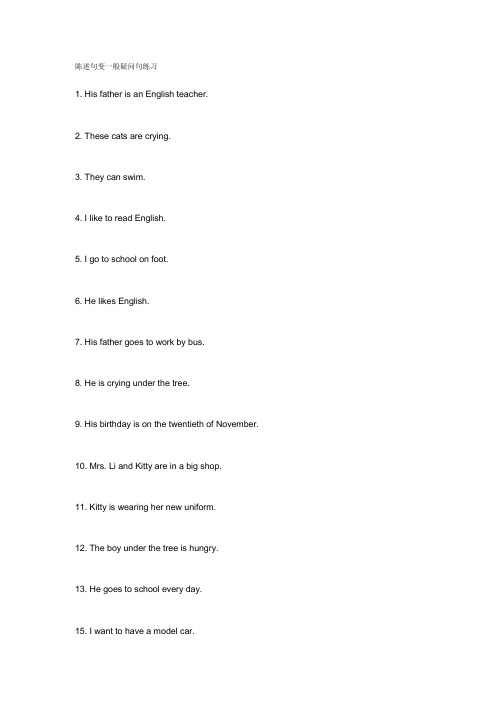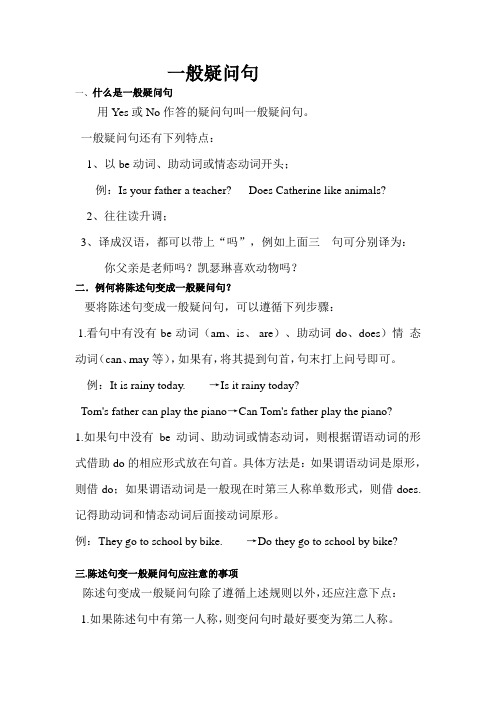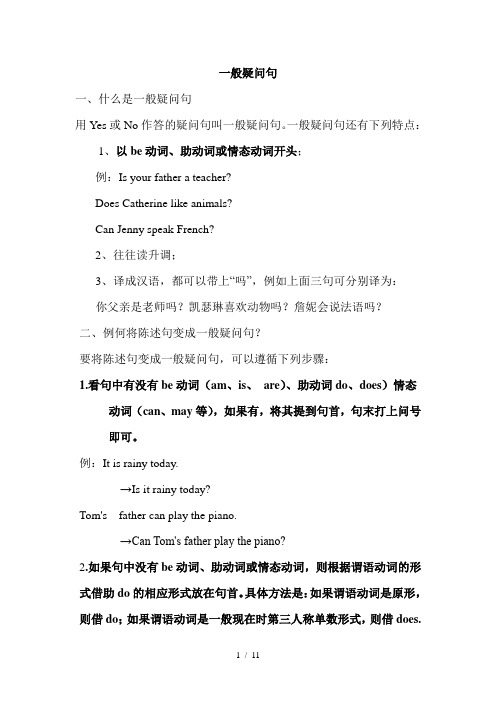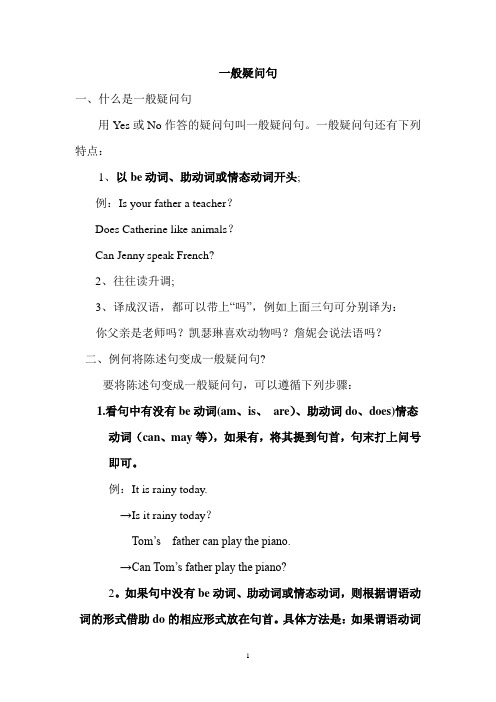陈述句变一般疑问句练习
(完整版)陈述句变一般疑问句练习

陈述句变一般疑问句练习1. His father is an English teacher.2. These cats are crying.3. They can swim.4. I like to read English.5. I go to school on foot.6. He likes English.7. His father goes to work by bus.8. He is crying under the tree.9. His birthday is on the twentieth of November.10. Mrs. Li and Kitty are in a big shop.11. Kitty is wearing her new uniform.12. The boy under the tree is hungry.13. He goes to school every day.15. I want to have a model car.16. She wants a cup of coffee.17. Mrs. Li and Kitty watch television at night.18. I do my homework after school将下列句子改成一般疑问句:1. It is a lovely dog.________________________________________2. She is lovely girl.________________________________________3. He is my father._________________________________________4. They are Lily’s cousins. ___________________________________5. We are classmates. ______________________________________6. I am a doctor. ________________________________________7. There is a bird in the tree. ________________________________8. There are many stars in the sky. ____________________________9. They are good friends. ____________________________________10. I love my parents. _______________________________________11. I play computer games every night. _________________________12. There are many books on the shelf. __________________________13. There is an ostrich in the zoo. _______________________________14. We have a pleasant home. __________________________________15. We like to climb the mountain. ______________________________16. They go to church on Sunday. ______________________________17. They walk to school every morning. __________________________18. It is a beautiful park. ______________________________19. It is a big map. ______________________________20. You are a singer. ______________________________用do does be 填空1> _____ she know all the answers ?Yes , she ____ . No, she _____.2> _____ the twins often fight ?Yes ,_____ do. No, _____ don’t.3> _____ your dad like listening to music?Yes ,____ does . No, _____ doesn’t.4>_____ uncle Tom wash his car everyday?Yes , ____ does . No, ____ doesn’t.5> _____ you have a new teacher?Yes , I ______. No, I ______.6>_____ she a teacher?Yes, she _____ . No, she _____.7> ______ you playing ball now?Yes, I ______. No, I ______.8> ______ the pig like to sleep?Yes, it ______. No, it _____.9> ______ five birds flying in the sky?Yes, they _____ .No, ____ aren’t.10> _____ your father smoking in the living room?Yes, ____ is .No, he _____.。
(完整版)陈述句变一般疑问句讲解练习及答案

一般疑问句一、什么是一般疑问句用Yes或No作答的疑问句叫一般疑问句。
一般疑问句还有下列特点:1、以be动词、助动词或情态动词开头;例:Is your father a teacher? Does Catherine like animals?2、往往读升调;3、译成汉语,都可以带上“吗”,例如上面三句可分别译为:你父亲是老师吗?凯瑟琳喜欢动物吗?二.例何将陈述句变成一般疑问句?要将陈述句变成一般疑问句,可以遵循下列步骤:1.看句中有没有be动词(am、is、 are)、助动词do、does)情态动词(can、may等),如果有,将其提到句首,句末打上问号即可。
例:It is rainy today. →Is it rainy today?Tom's father can play the piano→Can Tom's father play the piano?1.如果句中没有be动词、助动词或情态动词,则根据谓语动词的形式借助do的相应形式放在句首。
具体方法是:如果谓语动词是原形,则借do;如果谓语动词是一般现在时第三人称单数形式,则借does.记得助动词和情态动词后面接动词原形。
例:They go to school by bike. →Do they go to school by bike?三.陈述句变一般疑问句应注意的事项陈述句变成一般疑问句除了遵循上述规则以外,还应注意下点:1.如果陈述句中有第一人称,则变问句时最好要变为第二人称。
I usually have lunch at school→Do you usually have lunch at school? My father is playing soccer. →Is your father playing soccer?2.如果陈述句中有some, 则变问句时往往要变成any 。
There is some water on the playground. →Is there any water on the playground?四.一般疑问句的回答一般疑问句往往采用简短回答,共由三部分(三个单词)组成,对这三部分(三个单词)的确定可以概括例下:1.第一个词:不是Yes就是No。
陈述句变一般疑问句

陈述句变一般疑问句方法及练习1.检查句子中有无be动词或can, may等等情态动词,当句子中有be动词或can, may等等情态动词时,则把be动词或情态动词(can, could等等)提到主语的前面变成疑问句; 在be动词或can, may等等情态动词后面加not变成否定句.例:①陈述句:She is a student. 疑问句→ Is she a student?否定句→ She is not a student.②陈述句:I can swim. 疑问句→ Can you swim? 否定句→ I can n ot swim.2. 当句子中既没有be动词,也没有can, may等等情态动词时,则查看句子主语,①如果句子主语为非单数第三人称单数(you, they, we以及复数名词)时,在主语前加助动词do变问句, 在主语后谓语动词前加助动词don’t(I, you,以及复数)变否定。
②如果句子主语为单数第三人称单数时(单数名词,she, he, it)在主语前加助动词does变成问句;在主语后谓语动词前加助动词doesn’t(单数名词,she, he, it)变成否定句,助动词后的动词要变成动词原形。
例:①陈述句:We get up at 7:00 every morning.疑问句→Do you get up at 7:00 every morning?否定句→We don’t get up at 7:00 every morning.②陈述句:She has a little brother.疑问句→ Does she have a little brother?否定句→ She doesn’t have a little brother.练习1. Do you often play football after school? (肯定回答)2. I have many books. (改为否定句)3. Gao Shan’s sister likes playing table tennis (改为否定句)4. She lives in a small town near New York. (改为一般疑问句)5. I watch TV every day. (改为一般疑问句)6. David has got a goal. (改为一般疑问句)7. We have four lessons.(否定句)8. Nancy doesn’t run fast (肯定句)9. My dog runs fast.否定句:一般疑问句:10. Mike has two letters for him.一般疑问句:否定句:11. I usually play football on Friday afternoon.否定句:一般疑问句:12. Su Yang usually washes some clothes on Saturday.否定句:一般疑问句:13. Mingming usually waters the flowers every day.否定句:一般疑问句:14. Tom does his homework at home.否定句:一般疑问句:。
(完整版)小学四年级陈述句变一般疑问句(包含练习及标准答案)

一般疑问句一、什么是一般疑问句用Yes或No作答的疑问句叫一般疑问句。
一般疑问句还有下列特点:1、以be动词、助动词或情态动词开头;例:Is your father a teacher?Does Catherine like animals?Can Jenny speak French?2、往往读升调;3、译成汉语,都可以带上“吗”,例如上面三句可分别译为:你父亲是老师吗?凯瑟琳喜欢动物吗?詹妮会说法语吗?二、例何将陈述句变成一般疑问句?要将陈述句变成一般疑问句,可以遵循下列步骤:1.看句中有没有be动词(am、is、are)、助动词do、does)情态动词(can、may等),如果有,将其提到句首,句末打上问号即可。
例:It is rainy today.→Is it rainy today?Tom's father can play the piano.→Can Tom's father play the piano?2.如果句中没有be动词、助动词或情态动词,则根据谓语动词的形式借助do的相应形式放在句首。
具体方法是:如果谓语动词是原形,则借do;如果谓语动词是一般现在时第三人称单数形式,则借does.记得助动词和情态动词后面接动词原形。
例:They go to school by bike.→Do they go to school by bike?Bill gets up at 6:30 every day.→Does bill get up at 6:30 every day?三.陈述句变一般疑问句应注意的事项陈述句变成一般疑问句除了遵循上述规则以外,还应注意下列几点:1.如果陈述句中有第一人称,则变问句时最好要变为第二人称。
例:I usually have lunch at school.→Do you usually have lunch at school?My father is playing soccer.→Is your father playing soccer?2.如果陈述句中有some, 则变问句时往往要变成any 。
陈述句变一般疑问句练习题

陈述句变一般疑问句练习题导读:【一】1. His father is an English teacher.2. These cats are crying.3. They can swim.4. I like to read English.5. I go to school on foot.6. He likes English.7. His father goes to work by bus.8. He is crying under the tree.9. His birthday is on the twentieth of November.10. Mrs. Li and Kitty are in a big shop.11. Kitty is wearing her new uniform.12. The boy under the tree is hungry.13. He goes to school every day.15. I want to have a model car.16. She wants a cup of coffee.17. Mrs. Li and Kitty watch television at night.18. I do my homework after school.【二】1. Everybody is in the classroom.2. The boy does some housework at home.3. The children had a good time in the park.4. Jim has some story-books.5. Mr. Hunt told us something important at the meeting.6. The old man does morning exercises every morning.7. We are from China.8. I must finish my homework before eight o’clock.9. He often goes to the library on Sundays.【陈述句变一般疑问句练习题】1.陈述句改拟人句练习题2.疑问句的类型及特点3.老爸变!变!变!作文4.反问句改陈述句大全5.陈述句改成的拟人句6.反问句改陈述句的方法7.陈述句改为反问句的方法8.反问句改陈述句练习大全上文是关于陈述句变一般疑问句练习题,感谢您的阅读,希望对您有帮助,谢谢。
陈述句变疑问句练习

一、陈述句→一般疑问句(一)更正区域:1.I am an outgoing boy.2.She is talking to her friends happily.3.Jack can jump really high.4.They need to make the kite fly more easily.5.We shall meet at 8:00 tomorrow morning.6.Everyone should pay a part in protecting the environment.7.Linda didn’t do her homework yesterday.8.My dad has gone to Shanghai on business.9.She used to dance in the morning every day.10.John hadn’t worked in the school since he retired.11.You should drink some hot tea with honey.更正区域:2.It sound like you have a fever.3.He played computer games all the weekend.4.That’s probably why.5.You need to take breaks away from the computer.6.Her head and neck still hurt yesterday.7.People often don’t help others because they don’t want any trouble.8.The man was saved by the doctors in time.9.Some passengers helped Mr. Wang to move the man onto thebus.10.Wang ping expects most or all of the passengers to get off.21.I am an outgoing boy.一般疑问句:更正区域:特殊疑问句:2.She is talking to her friends happily.一般疑问句:特殊疑问句:3.Jack can jump really high.一般疑问句:特殊疑问句:4.They need to make the kite fly more easily.一般疑问句:特殊疑问句:5.We shall meet at 8:00 tomorrow morning.一般疑问句:特殊疑问句:6.Everyone should pay a part in protecting the environment.一般疑问句:特殊疑问句:7.Linda didn’t do her homework yesterday.一般疑问句:特殊疑问句:8.My dad has gone to Shanghai on business.一般疑问句:特殊疑问句:9.She used to dance in the morning every day.一般疑问句:特殊疑问句:10.John hadn’t worked in the school since he retired.一般疑问句:特殊疑问句:34二、陈述句碱→特殊疑问句(二)11. You should drink some hot tea with honey.一般疑问句: 特殊疑问句: 12. It sound like you have a fever.一般疑问句: 特殊疑问句: 13. He played computer games all the weekend.一般疑问句: 特殊疑问句: 14. That’s probably why.一般疑问句: 特殊疑问句: 15. You need to take breaks away from the computer.一般疑问句: 特殊疑问句: 16. Her head and neck still hurt yesterday.一般疑问句: 特殊疑问句:17. People often don’t help others because they don’t want any trouble.一般疑问句: 特殊疑问句: 18. The man was saved by the doctors in time.一般疑问句: 特殊疑问句:19. Some passengers helped Mr. Wang to move the man onto the bus.一般疑问句: 特殊疑问句: 20. Wang ping expects most or all of the passengers to get off.一般疑问句:特殊疑问句:更正区域:5。
小学四年级陈述句变一般疑问句(包含练习及答案)

一般疑问句一、什么是一般疑问句用Yes或No作答的疑问句叫一般疑问句。
一般疑问句还有下列特点:1、以be动词、助动词或情态动词开头;例:Is your father a teacher?Does Catherine like animals?Can Jenny speak French?2、往往读升调;3、译成汉语,都可以带上“吗”,例如上面三句可分别译为:你父亲是老师吗?凯瑟琳喜欢动物吗?詹妮会说法语吗?二、例何将陈述句变成一般疑问句?要将陈述句变成一般疑问句,可以遵循下列步骤:1.看句中有没有be动词(am、is、are)、助动词do、does)情态动词(can、may等),如果有,将其提到句首,句末打上问号即可。
例:It is rainy today.→Is it rainy today?Tom’s father can play the piano.→Can Tom’s father play the piano?2。
如果句中没有be动词、助动词或情态动词,则根据谓语动词的形式借助do的相应形式放在句首。
具体方法是:如果谓语动词是原形,则借do;如果谓语动词是一般现在时第三人称单数形式,则借does.记得助动词和情态动词后面接动词原形。
例:They go to school by bike。
→Do they go to school by bike?Bill gets up at 6:30 every day。
→Does bill get up at 6:30 every day?三.陈述句变一般疑问句应注意的事项陈述句变成一般疑问句除了遵循上述规则以外,还应注意下列几点:1。
如果陈述句中有第一人称,则变问句时最好要变为第二人称。
例:I usually have lunch at school.→Do you usually have lunch at school?My father is playing soccer.→Is your father playing soccer?2。
小学四年级陈述句变一般疑问句(包含练习及答案)

小学四年级陈述句变一般疑问句(包含练习及答案)一般疑问句是一种需要用Yes或No回答的疑问句。
它有以下特点:1.以be动词、助动词或情态动词开头,例如:Is your father a teacher。
Does Catherine like animals。
Can ___ speak French?2.往往读升调。
3.译成汉语时,可以带上“吗”。
要将陈述句变成一般疑问句,可以遵循以下步骤:1.查看句子中是否有be动词(am、is、are)、助动词do、does)或情态动词(can、may等),如果有,将其提到句首,句末加上问号即可。
例如:It is rainy today。
→ Is it rainy today。
Tom's father can play the piano。
→ Can Tom's father play the piano?2.如果句子中没有be动词、助动词或情态动词,则根据谓语动词的形式借助do的相应形式放在句首。
具体方法是:如果谓语动词是原形,则借do;如果谓语动词是一般现在时第三人称单数形式,则借does。
记得助动词和情态动词后面接动词原形。
例如:They go to school by bike。
→ Do they go to school by bike。
Bill gets up at 6:30 every day。
→ Does Bill get up at 6:30 every day?在将___变成一般疑问句时,还应注意以下几点:1.如果陈述句中有第一人称,则最好将其变为第二人称。
例如:I usually have lunch at school。
→ Do you usually have lunch at school。
My ___。
→ Is your father playing soccer?2.如果陈述句中有some,则变问句时往往要变成any。
- 1、下载文档前请自行甄别文档内容的完整性,平台不提供额外的编辑、内容补充、找答案等附加服务。
- 2、"仅部分预览"的文档,不可在线预览部分如存在完整性等问题,可反馈申请退款(可完整预览的文档不适用该条件!)。
- 3、如文档侵犯您的权益,请联系客服反馈,我们会尽快为您处理(人工客服工作时间:9:00-18:30)。
陈述句变一般疑问句练习
1. His father is an English teacher.
2. These cats are crying.
3. They can swim.
4. I like to read English.
5. I go to school on foot.
6. He likes English.
7. His father goes to work by bus.
8. He is crying under the tree.
9. His birthday is on the twentieth of November.
10. Mrs. Li and Kitty are in a big shop.
11. Kitty is wearing her new uniform.
12. The boy under the tree is hungry.
13. He goes to school every day.
15. I want to have a model car.
16. She wants a cup of coffee.
17. Mrs. Li and Kitty watch television at night.
18. I do my homework after school
将下列句子改成一般疑问句:
1. It is a lovely dog.________________________________________
2. She is lovely girl.________________________________________
3. He is my father._________________________________________
4. They are Lily’s cousins. ___________________________________
5. We are classmates. ______________________________________
6. I am a doctor. ________________________________________
7. There is a bird in the tree. ________________________________
8. There are many stars in the sky. ____________________________
9. They are good friends. ____________________________________
10. I love my parents. _______________________________________
11. I play computer games every night. _________________________
12. There are many books on the shelf. __________________________
13. There is an ostrich in the zoo. _______________________________
14. We have a pleasant home. __________________________________
15. We like to climb the mountain. ______________________________
16. They go to church on Sunday. ______________________________
17. They walk to school every morning. __________________________
18. It is a beautiful park. ______________________________
19. It is a big map. ______________________________
20. You are a singer. ______________________________
用do does be 填空
1> _____ she know all the answers ?
Yes , she ____ . No, she _____.
2> _____ the twins often fight ?
Yes ,_____ do. No, _____ don’t.
3> _____ your dad like listening to music?
Yes ,____ does . No, _____ doesn’t.
4>_____ uncle Tom wash his car everyday?
Yes , ____ does . No, ____ doesn’t.
5> _____ you have a new teacher?
Yes , I ______. No, I ______.
6>_____ she a teacher?
Yes, she _____ . No, she _____.
7> ______ you playing ball now?
Yes, I ______. No, I ______.
8> ______ the pig like to sleep?
Yes, it ______. No, it _____.
9> ______ five birds flying in the sky?
Yes, they _____ .No, ____ aren’t.
10> _____ your father smoking in the living room?
Yes, ____ is .No, he _____.。
